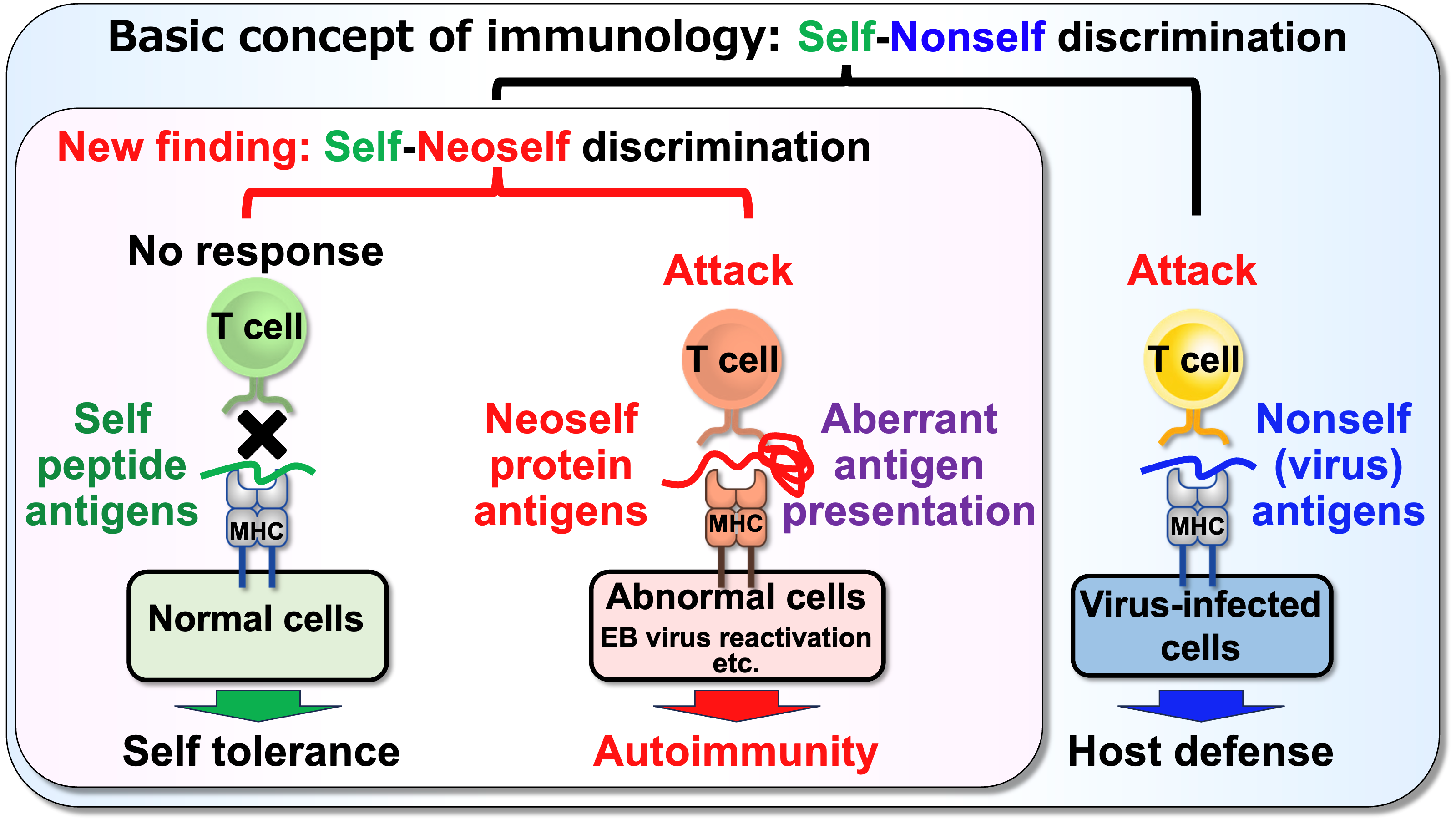Neoself-antigens induce autoimmunity in lupus (Arase Lab, in Cell)
Major points
- It has long been a mystery why immune cells attack their own tissues in autoimmune diseases.
- his study revealed that T cells recognize abnormal self-antigens, known as neoself antigens, as nonself antigens. This recognition leads to the attack on their own tissues, resulting in autoimmune diseases.
- Most people are persistently infected with the Epstein-Barr virus (EBV), and frequent EBV reactivation is a known risk factor for autoimmune diseases. Our study found that neoself antigens induced by EBV reactivation activate pathogenic T cells, which cause autoimmune diseases. This finding offers a new perspective on the association between viral infection and the development of autoimmune diseases.
- Our findings demonstrate that T cells can distinguish between neoself antigens and self antigens. This represents a significant advancement in the fundamental concepts of immunology and is a crucial discovery for understanding various physiological and pathological immune responses. It is also important for developing novel therapies targeting the causes of autoimmune diseases.
Summary
Autoimmune diseases are widespread and notoriously difficult to treat. In part, this is because why the immune system attacks its own tissues in patients with these conditions remains poorly understood.
This study has revealed that T cells discriminate between self and neoself antigens, and that T cell responses to neoself antigens are the cause of autoimmune diseases. Particularly, we have found that a dysfunction in the Major Histocompatibility Complex (MHC) class II, which presents antigens to helper T cells, leads to the presentation of abnormal self-antigens (neoself-antigens), resulting in an immune response against neoself antigens and causing autoimmune diseases.
Normally, immune cells recognize abnormal cells, such as virus-infected cells, as nonself and attack them, but they do not recognize normal cells. In autoimmune diseases, immune responses against normal cells and tissues are induced, but the cause has long been unknown. In this study, by establishing mice that can induce neoself antigens by causing MHC class II dysfunction, we discovered that neoself antigens presented on MHC class II cause the development of systemic autoimmune diseases. Furthermore, we found that approximately 10% of the abnormally activated T cells in patients with systemic lupus erythematosus (SLE), a systemic autoimmune disease, recognize neoself antigens presented on MHC class II. On the other hand, the high reactivation frequency of the Epstein-Barr virus (EBV), which persistently infects most adults, is known to be a risk factor for the development of SLE. This study has shown that EBV reactivation causes MHC class II dysfunction, resulting in the presentation of neoself antigens on MHC class II and activation of autoreactive T cells in SLE patients.
This article was published in Cell, on Sept 13, 2024.
Title: “Neoself-antigens are the primary target for autoreactive T cells in human lupus”
Authors: Shunsuke Mori, Masako Kohyama, Yoshiaki Yasumizu, Asa Tada1, Kaito Tanzawa, Tatsuya Shishido, Kazuki Kishida, Hui Jin, Masayuki Nishide, Shoji Kawada, Daisuke Motooka, Daisuke Okuzaki, Ryota Naito, Wataru Nakai, Teru Kanda, Takayuki Murata, Chikashi Terao, Koichiro Ohmura, Noriko Arase, Tomohiro Kurosaki, Manabu Fujimoto, Tadahiro Suenaga, Atsushi Kumanogoh, Shimon Sakaguchi, Yoshihiro Ogawa, Hisashi
DOI:https://doi.org/10.1016/j.cell.2024.08.025
Links
- Home
- Achievement
- Research Activities
- Neoself-antigens induce autoimmunity in lupus (Arase Lab, in Cell)








